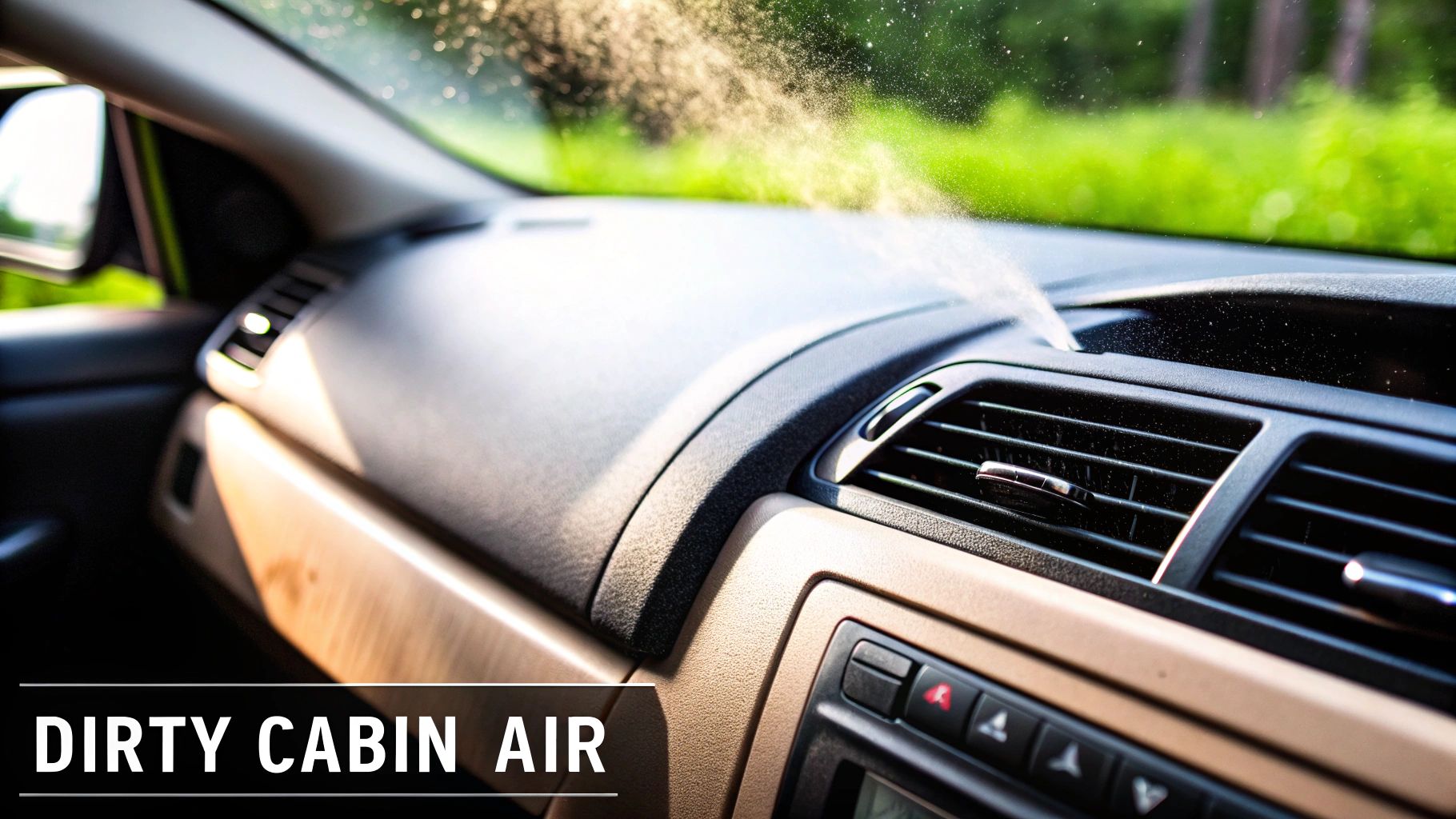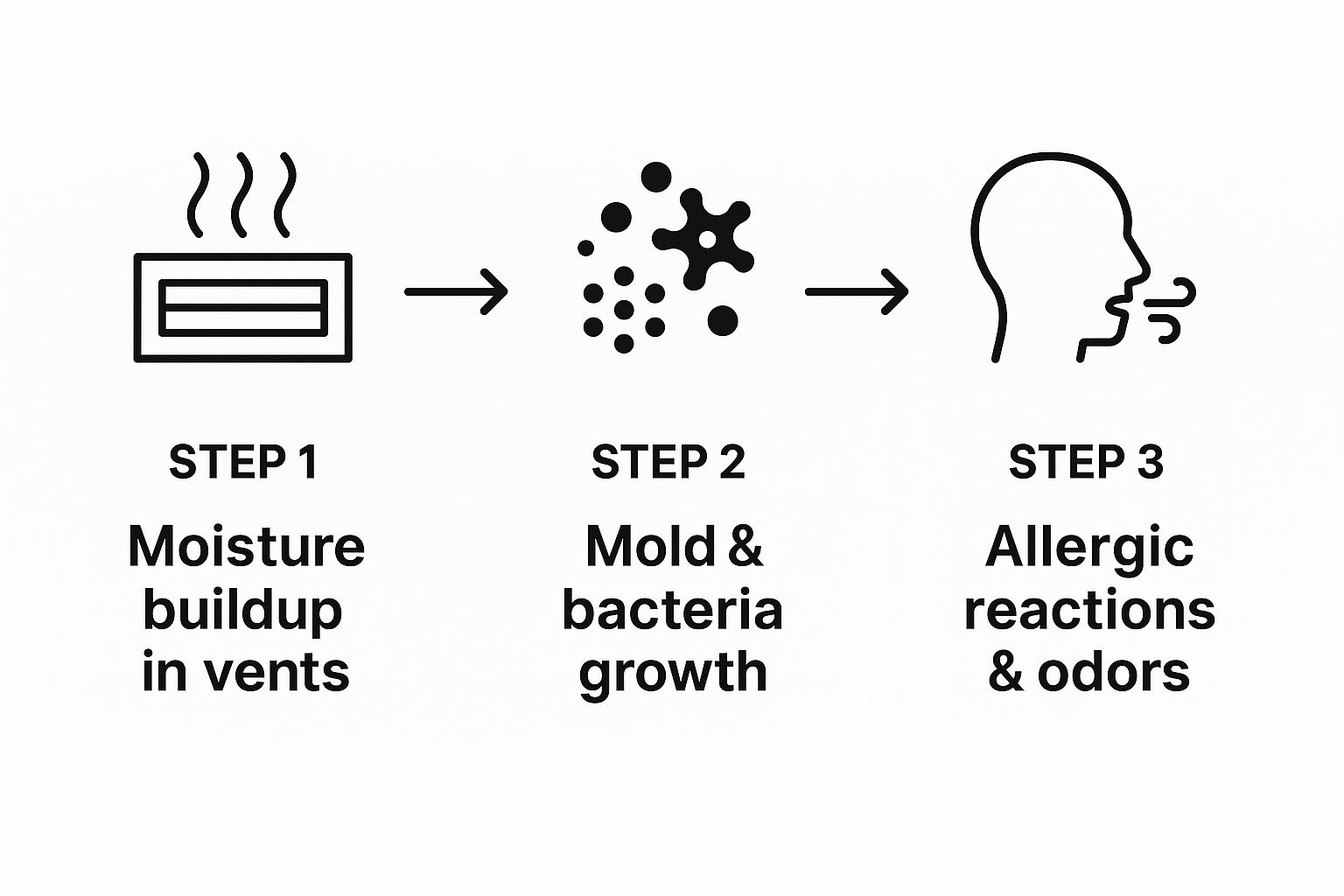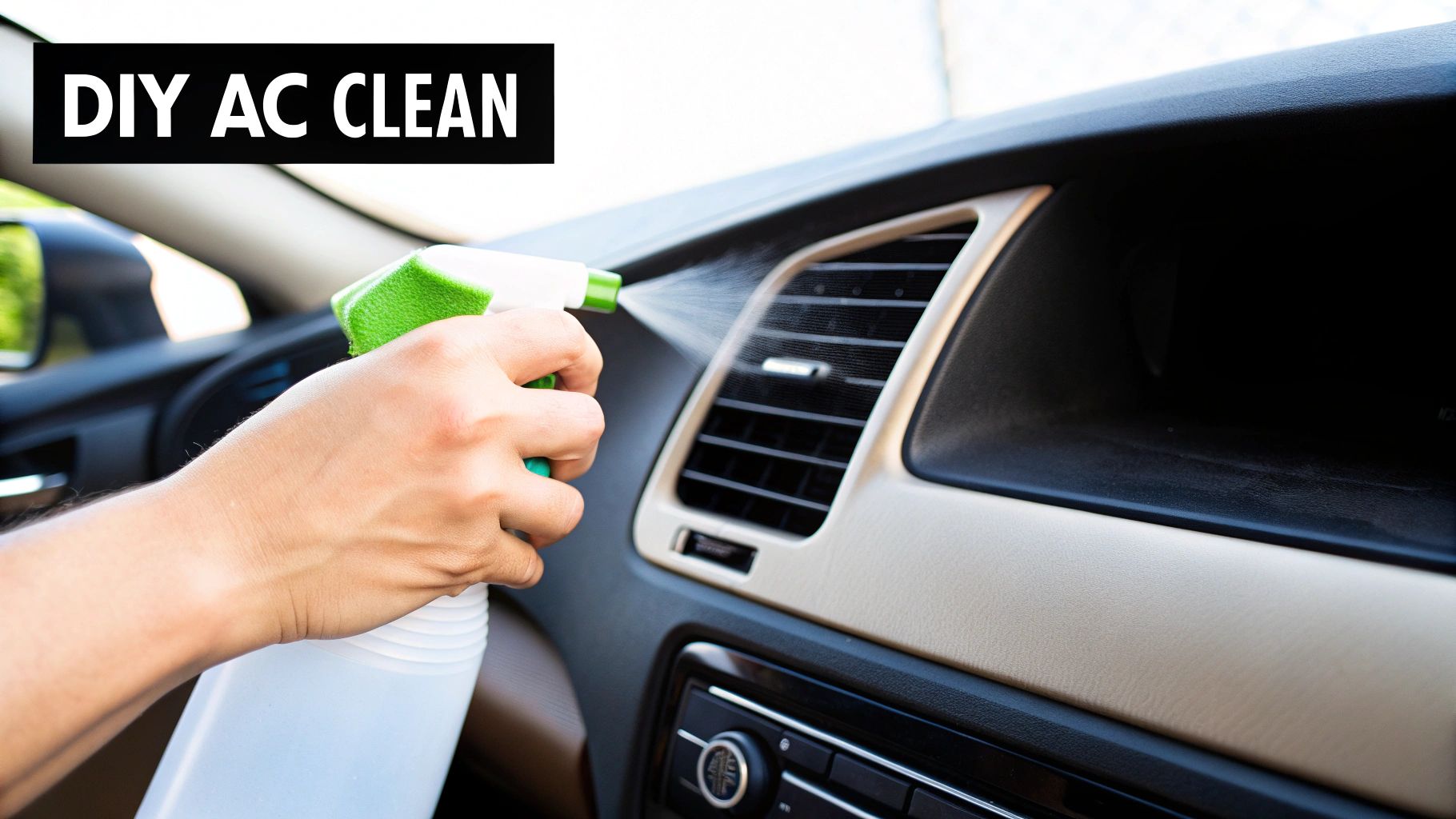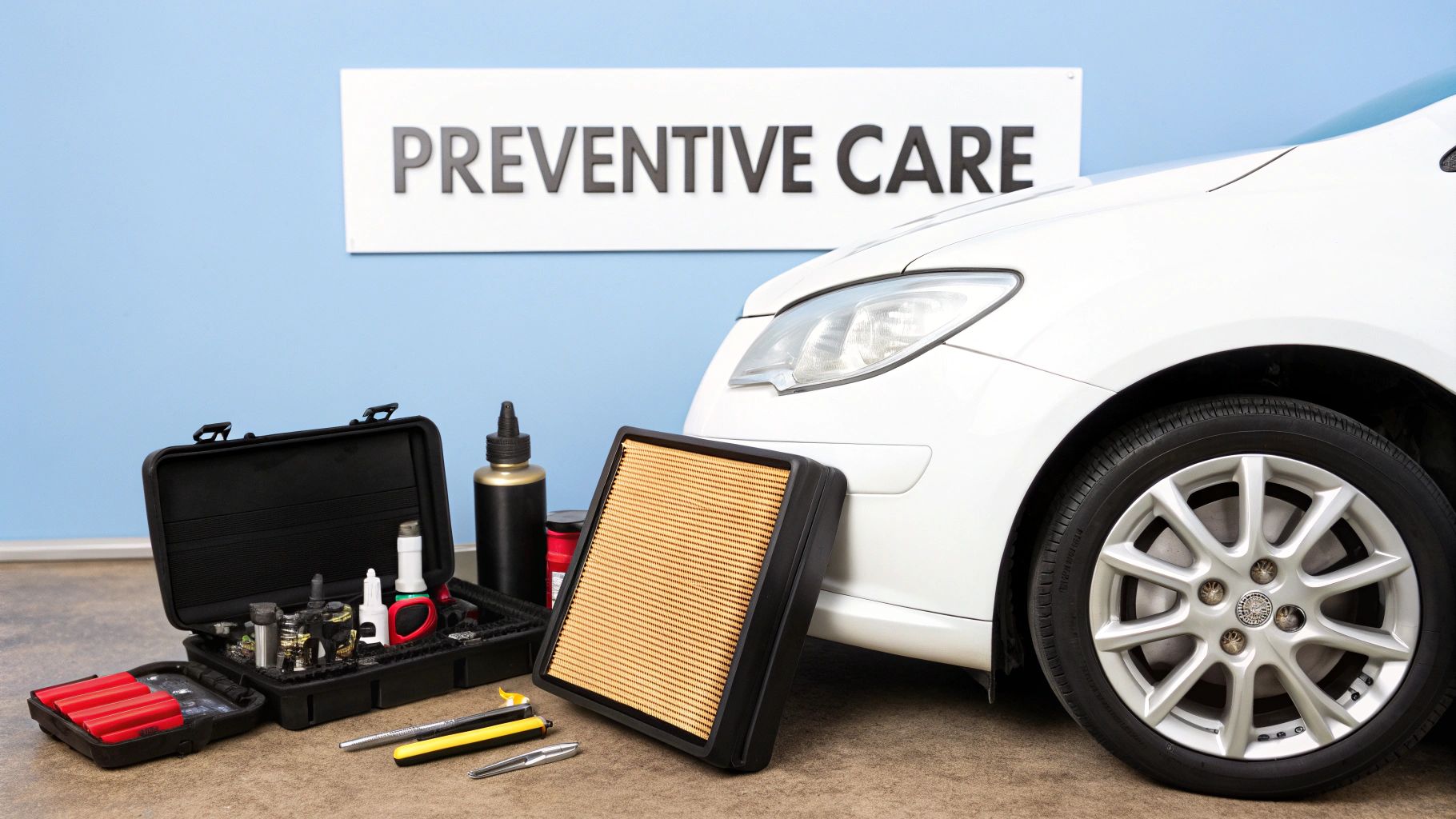Why Your Car Air Conditioning Smells Bad and How to Fix It
- coledem
- Sep 13, 2025
- 13 min read
Ever switched on your car’s air conditioning expecting a blast of cool, fresh air, only to be hit with a smell like old, damp socks? You're not alone. More often than not, that unpleasant odour is caused by moisture and bacteria building up deep inside your AC system, especially on a part called the evaporator coil. It’s the perfect dark, damp spot for mould and mildew to thrive.
Diagnosing That Bad Smell From Your Car Vents
When a funky smell starts wafting from your car's vents, it’s not just an annoyance—it's a clue. Your car is trying to tell you something's wrong, and figuring out what that smell is will point you straight to the problem. A musty whiff is a world away from a sweet or burning scent, and each one signals a completely different issue.
Understanding the basics of how your air con actually works can shed some light on why these things happen. If you're curious, you can get a full rundown in our guide on what every driver needs to know about car air conditioning in 2025. Knowing the fundamentals helps make sense of why a certain smell points to a specific problem.
What Different AC Odours Mean
Different smells point to different problems, from a simple fix you can do yourself to a serious mechanical fault. That classic musty scent is easily the most common complaint we hear. It is almost always a sign of mould or mildew growing inside the evaporator case because moisture has collected and isn't draining away properly.
Here in the UK, it’s a particularly frequent issue. We tend to use our AC seasonally, and shorter drives don't give the system enough time to dry out completely. This lingering dampness creates an ideal breeding ground for the bacteria that cause that stale, unpleasant smell, which can also degrade the air quality inside your car.
A sweet, almost syrupy smell is a major red flag for a coolant leak, likely coming from the heater core. Coolant contains ethylene glycol, which has a very distinct sweet scent. This is a much more serious issue that can lead to your engine overheating and needs a professional eye.
Common AC Smells and What They Mean
Getting specific about the type of smell can help you diagnose the problem faster. A burning plastic odour, for instance, could indicate an electrical short or a blower motor on its way out. If you smell petrol, that’s an urgent one—it could be a dangerous fuel leak somewhere.
To help you out, here's a quick reference table to match the smell to its likely source and figure out your next move.
Smell Description | Most Likely Cause | Recommended First Action |
|---|---|---|
Musty or Sour | Mould, mildew, or bacteria in the evaporator or vents. | Replace the cabin air filter and use an AC disinfectant spray. |
Sweet or Syrupy | Coolant (antifreeze) leak, often from the heater core. | Check coolant levels and look for leaks. See a mechanic. |
Burning Plastic | Overheating blower motor, resistor, or other electrical fault. | Turn off the AC system and have it inspected professionally. |
Rotten Eggs | A failing catalytic converter. | Do not ignore this. Seek immediate mechanical diagnosis. |
This table should give you a solid starting point, but remember, if you're ever in doubt—especially with burning or fuel smells—it's always safest to get a professional diagnosis.
Getting Your Gear Together for AC Odour Removal

Before you begin to battle that funky smell from your car's air conditioning, it’s worth taking a few minutes to get your supplies in order. Trust me, having everything you need within arm's reach makes the whole job go a lot smoother and far more effectively. A bit of preparation now saves a lot of frustration later.
You've probably got some of the basics already. Grab your vacuum cleaner, and find the crevice tool attachment – it’s perfect for getting into the vents and around the cabin filter housing. A few soft-bristled brushes will also come in handy for shifting any stubborn dust, and you'll want a couple of clean microfibre cloths for wiping surfaces down.
Specialised Cleaners for the Job
Now, for the serious stuff. While your standard household kit is a good start, getting rid of mould and bacteria for good requires products made for vehicle AC systems. These are formulated to be tough on the nasties causing the smell, but safe for your car’s delicate components.
AC Disinfectant Spray: You might have heard these called "air con bombs." They're fantastic. You set them off inside the car with the air recirculation on, and the mist gets pulled through the entire system, killing off mould and bacteria hiding deep in the evaporator and ductwork.
Evaporator Foam Cleaner: This is a more targeted approach. It usually comes with a long, thin tube that you feed up the AC drain hose or into the cabin filter slot. The foam expands to completely cover the evaporator coil, breaking down all the gunk and germs before it turns back into a liquid and drains away.
A New Cabin Air Filter: This one is non-negotiable. There is zero point in cleaning the whole system only to blast fresh air through a filthy, bacteria-ridden filter. Have a fresh one that’s the correct fit for your car ready to go.
A quick tip from experience: when you're buying a cleaner, check the label to confirm it kills bacteria and mildew. A simple air freshener is just a mask; a proper disinfectant gets to the root of why your car air conditioning smells bad in the first place.
Don't Forget Your Safety Gear
Finally, a quick word on looking after yourself. Some of these cleaning agents can be quite potent, and you'll be dealing with areas full of dust and mould spores you don't want to be breathing in.
A pair of simple disposable gloves is a must to keep chemicals and grime off your hands. I'd also strongly recommend wearing some safety glasses, especially if you're using a foam cleaner in a tight spot – you don’t want any of that splashing back into your eyes. And always, always work in a well-ventilated space. Open the garage door or, better yet, do the job outside.
Practical Methods for Cleaning Your Car's AC System
Right, you’ve got your supplies, so let's get that smell sorted. There are a few different ways to clean your car's AC system, from quick fixes to more hands-on approaches. We'll kick things off with the simplest solutions that usually do the trick without much fuss.
It's a classic cycle: moisture builds up, and before you know it, you've got a funky smell. This little illustration shows just how a bit of condensation can snowball into a real problem that ruins your drive.

As you can see, what starts as harmless moisture quickly turns into a breeding ground for bacteria. That's the direct cause of the bad smells and potential allergens being blasted around your cabin.
Start With the Cabin Air Filter
Before you even think about chemical cleaners, your first port of call should always be the cabin air filter. This little part is the gatekeeper, filtering dust, pollen, and other gunk from the air before it gets to you. When it gets clogged, it doesn’t just block airflow—it becomes a damp, grimy home for mould and bacteria.
Finding it is usually pretty easy. In most cars, it’s tucked away behind the glove box. You'll probably need to unclip the glove box so it can drop down, which will reveal the filter's housing.
Once you can get to it, slide the old filter out. Don't be surprised if it's full of leaves, dirt, and all sorts of grime. Popping in a fresh one can make a huge difference to the air quality and often gets rid of minor musty smells completely.
Using an Aerosol Disinfectant Bomb
If a new filter doesn't quite get you there, it's time to bring out an aerosol disinfectant, often called an "AC bomb" or "air con bug bomb." This is a great way to treat the whole system at once, getting deep into the vents and right to the evaporator core where those smells are born. It's a surprisingly simple and effective way to kill off the microbes causing the stink.
To get the best results, here’s what you do:
Start the car and crank the air conditioning up to full blast.
Set the system to recirculate mode, not fresh air. This is key because it means the cleaner will cycle through the internal system.
Pop the can somewhere central in the car, like the passenger-side floor mat, making sure it won't fall over.
Activate the can by pushing the tab down until it locks into place.
Get out of the car straight away and close all the doors and windows.
Leave the product to do its thing for the time recommended on the can, usually about 10-15 minutes.
When the time’s up, open every door and window to air the car out properly for at least another 10-15 minutes before you drive it anywhere.
Remember, the whole point of recirculation is to create a closed loop. The disinfectant gets sucked in through the interior vents, works its way through the evaporator, and then gets blown back out, treating every part of the air's journey.
Applying a Foam Cleaner for a Deeper Clean
For those stubborn smells that even a bomb can’t shift, a direct-application foam cleaner is your most powerful option. This stuff is designed to be sprayed directly onto the evaporator coil, which is ground zero for most mould and mildew growth. The foam expands to cover all the little fins, breaking down the grime before turning back into a liquid and draining out through the car's AC drain tube.
A common culprit for AC odours is a dirty condensate drain line. Understanding some general techniques, like how to clean AC condensate drain lines, can be really helpful for tackling this problem across different types of AC systems.
To apply the foam, you typically feed a long, thin tube into the evaporator case. The easiest way in is often through the AC drain tube from underneath the car. You just push the tube up the drain hose until you feel it reach the evaporator, then spray the foam in. For a more detailed walkthrough of this and other fixes, you can have a look at our easy step-by-step guide on how to fix car air conditioning. It’s a much more targeted and thorough clean, perfect for those really severe cases where the car air conditioning smells bad.
Tackling Those Really Stubborn AC Smells

So, you've tried the disinfectant sprays, you've even swapped out the cabin filter, but that unpleasant smell is still hanging around. What now? When a standard clean doesn't cut it, that’s usually a tell-tale sign that the problem runs deeper than the surface. It's time to explore some more heavy-duty solutions.
A smell that stubbornly sticks around often points to a serious build-up of mould or bacteria hidden deep within the system, far beyond the reach of a simple aerosol can. The real issue could be a heavily contaminated evaporator core or a blockage somewhere that's trapping moisture inside.
Time to Call in the Experts
For truly persistent odours, one of the most effective solutions is a professional ozone treatment. Ozone (O₃) is a powerful, highly reactive gas that neutralises the organic compounds—like mould and bacteria—that are causing the smell in the first place.
A technician brings in a specialised machine that fills your car’s cabin with ozone gas. They'll run the AC so it circulates through the entire ventilation system, getting into every last nook and cranny. It's brilliant for smells that have seeped into the seats and carpets, too. The whole process usually takes a few hours, and afterwards, the car needs to be aired out properly because concentrated ozone isn't safe to breathe.
Bear in mind, an ozone treatment is purely for odour elimination. It kills the microscopic culprits causing the smell, but it won’t remove any physical gunk or fix the underlying moisture issue.
Have You Checked the AC Drain Tube?
Another very common reason for a nasty smell that just won't go away is a blocked AC drain tube. This little rubber hose is meant to channel condensation away from the evaporator and let it drip out under the car, usually on the passenger side near the firewall.
If it gets clogged up with road grime, leaves, or even insects, water can't escape. This creates a stagnant puddle inside the evaporator case—the perfect breeding ground for mould. You can often check this yourself. Find the tube and give it a gentle squeeze or poke a flexible wire up it to see if you can shift the blockage. If you get a sudden gush of water, you’ve found your problem!
If you suspect you're dealing with a serious mould problem, this guide to mold removal in air ducts has some excellent information on tackling these kinds of stubborn issues.
Knowing when to give up is half the battle. If you’ve cleaned the vents, put in a new filter, and cleared the drain tube but the smell is still there, it’s time to book in with a mechanic. They have specialised cameras and tools to get a direct look at the evaporator core and spot problems you can't see. Sometimes, a healthy system needs more than just a clean; a car air conditioning regas in Bedford can also be important for keeping everything running cool and fresh.
Keeping Your Car AC Smelling Fresh for the Long Haul
Once you've done the hard work of banishing those nasty smells, the game shifts to prevention. A few simple habits are all it takes to stop mould and bacteria from making a comeback, keeping the air in your car clean and pleasant. It all comes down to tackling the root cause: moisture.
One of the most effective tricks in the book is also one of the easiest. A few minutes before you get to your destination, simply switch off the "AC" button but keep the fan blowing. This simple action allows air to flow over the evaporator coil, drying out the condensation that's built up. Without that damp environment, mould and mildew just can't get a foothold.
Build a Simple Maintenance Routine
When it comes to fighting off a smelly car air conditioner, consistency is your best friend. A straightforward maintenance schedule will keep the system clean and healthy, nipping potential issues in the bud. You don't need to do much, but doing it regularly makes all the difference.
A great place to start is using your air conditioning all year round, not just during summer heatwaves. Try to run it for about ten minutes at least once a week, even when it's cold outside. This gets the refrigerant and lubricant moving through the system, which is critical for keeping the seals supple. It stops them from drying out and cracking—a common cause of leaks.
Many drivers make the mistake of only switching on the AC in summer. But running it regularly throughout the year is genuinely one of the most effective things you can do to maintain the system's health and stop those musty smells from ever developing.
Key Preventative Actions
Here are a few key actions to weave into your regular car care. For an even more thorough explanation, have a look at our complete guide on essential car air conditioning care tips for every driver.
Change the Cabin Air Filter: Make this a non-negotiable part of your annual service. A fresh, clean filter is your first line of defence, trapping pollutants before they can get into the AC system and start causing smells.
Keep Your Interior Clean: It sounds simple, but it works. Regularly vacuum your car's interior, paying close attention to the footwells. Old leaves, forgotten food wrappers, and general dirt can easily get sucked into the system and become a breeding ground for bad odours.
Schedule Professional Servicing: It’s a smart move to get a professional AC service every couple of years. Data from the UK automotive sector shows that 20-30% of all AC complaints are directly related to odours from bacterial contamination. Mechanics often recommend a full service every two years to check for leaks and recharge the refrigerant, keeping the whole system running efficiently. For more insights, you can learn about UK air conditioner maintenance schedules on countryvehicles.co.uk.
By adopting these habits, you’re actively disrupting the cycle of moisture buildup and bacterial growth. It's a small investment of your time that pays off every single time you get behind the wheel and breathe in that fresh, clean air.
Answering Your Lingering Questions About Car AC Smells

Even after giving your air conditioning system a thorough clean, you might still have a few questions. That's perfectly normal. Getting to grips with how the system works and why certain issues crop up is the best way to keep your car’s air fresh for the long haul. Let's tackle some of the most common queries we hear from drivers.
First, the big one: is that funky AC smell dangerous? For the most part, a musty or "old sock" smell is just mould and bacteria. While unpleasant, it's usually not hazardous for healthy individuals, though it can certainly aggravate allergies or asthma.
Some odours are red flags. A distinctly sweet scent is a classic sign of a coolant leak, which can lead to your engine overheating. If you ever smell petrol or burning plastic, that's an immediate safety risk. Get it checked by a professional right away.
Why Does the Bad Smell Keep Coming Back?
It’s incredibly frustrating when you spend time cleaning the system, only for the smell to return a few weeks later. This almost always means the root cause of the moisture build-up hasn’t been sorted.
Often, people clean the vents but don't manage to reach the evaporator coil, where the real problem lives. Think of it as wiping the counter but leaving a spill under the fridge.
Another frequent culprit is a clogged AC drain tube. If condensation has nowhere to go, it pools inside the unit, creating a perfect environment for mould to grow all over again.
The key takeaway here is that cleaning is only half the battle. To stop the smell from returning, you need to build good habits, like running the fan without the AC for a few minutes before you switch off the engine. This helps dry everything out properly.
Are DIY AC Cleaning Kits Safe to Use?
Generally, yes. Most over-the-counter kits you find in auto shops—whether they’re aerosol "bombs" or foam cleaners—are perfectly safe and can be quite effective, but only if you use them correctly. The golden rule is to follow the instructions on the label to the letter. These products are designed for consumer use and won't harm your car's interior or AC components when applied as directed.
A few quick tips for staying safe:
Make sure the car is well-ventilated after the treatment. Open all the doors and let it air out.
Never sit inside the vehicle while an aerosol "bomb" is being deployed.
It's always a good idea to wear gloves and safety glasses, particularly when applying foam cleaners directly into the vents or housing.
If you've tried a DIY kit and the car air conditioning still smells bad, it’s a clear sign you’re dealing with a more stubborn problem. Some mould and bacteria build-ups are just too tough for consumer-grade products. That's when it's time to call in a mechanic who can get to the root of the issue and properly sanitise the entire system, giving you lasting fresh air for every journey.
If you're stuck with a persistent AC odour or need a professional to get your system running cleanly and efficiently, the team at Krause Autos is here to help. From diagnostics to a full regas service, we will make sure your car's air is fresh and healthy. Visit us at https://www.krauseautos.co.uk to book your appointment.





Comments